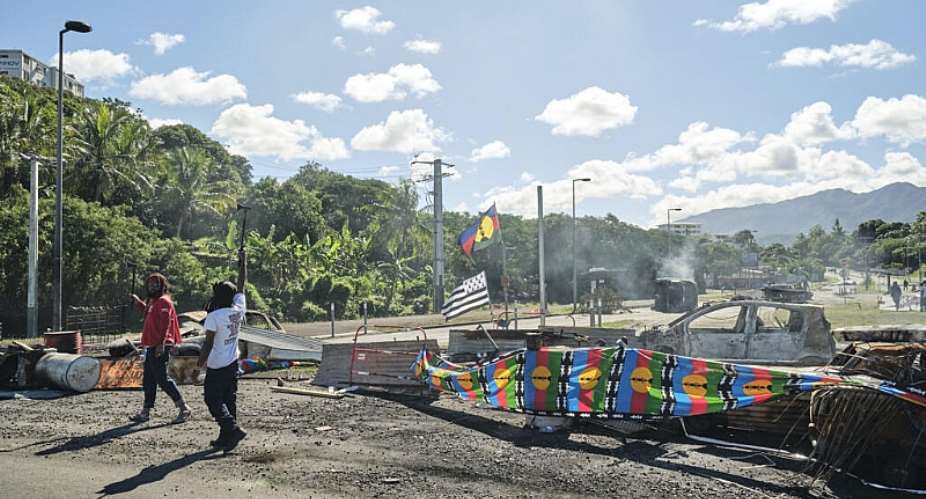President Emmanuel Macron was flying back to mainland France from the overseas territory of New Caledonia on Friday, after talks with pro- and anti-independence politicians during which he promised not to impose a contested voting reform that would massively expand the electorate.
The move to revamp voting rights in the South Pacific archipelago led to rioting and civil disorder.
As part of efforts to ease the tension, Macron rearranged his schedule to make the 16,000 kilometre journey from Paris.
He said he wants local leaders to come up with an alternate agreement for New Caledonia's future.
"I have pledged that this reform won't be pushed through with force in the current context and that we are giving ourselves a few weeks to allow for calm, the resumption of dialogue, with a view to a global agreement," he said.
The spate of violence has left at least six people dead and has been accompanied by a series of shootings as well as arson attacks and looting.
Macron, who arrived on Thursday, laid out a roadmap that he said could lead to another referendum for the French territory.
Indigenous Kanaks want an end to France's rule despite defeat in three earlier polls on the issue between 2018 and 2021, the last of which was boycotted by the main independence movement.
Thorny question
On Friday, La Tontouta International Airport, about 50 kilometres from the capital Noumea, remained closed along with schools and colleges.
The unrest began in response to legislation in the French parliament that Kanaks fear will dilute their influence by allowing more recent arrivals to the archipelago to vote in local elections.
Currently, only natives and those who arrived on the archipelago before 1998, along with their descendants, have the right to vote. The planned reform would expand it to people who have lived in New Caledonia for at least 10 years, adding an estimated 25,000 to the electoral roll.
Opponents fear the measure will benefit pro-France politicians in New Caledonia and further marginalise Kanaks, who once suffered from strict segregation policies.
Supporters say the proposed reform is democratically important for people with roots in New Caledonia who cannot currently vote for local representatives.
Both houses of parliament in Paris have approved the overhaul. The next step was to have been a special congress of both houses to implement it by amending France's constitution.
That had been expected by the end of June. But Macron's comments in Noumea suggested he is willing to rewrite the timetable.
Rival camps
Pro-independence Kanak leaders, who a week earlier declined Macron's offer of talks by video, joined a meeting with the president and rival campaigners who want New Caledonia to stay part of France. Macron also met separately with both camps.
Macron repeatedly pushed for the removal of protesters' barricades and said police sent in to help battle the violence would stay as long as necessary, despite their scheduled deployment in France for the upcoming Paris Olympics.
He said a state of emergency to boost police powers could only be lifted if local leaders called for the removal of barricades erected in Noumea and beyond.
"Everyone has a responsibility to really call for the lifting of the barricades, the cessation of all forms of attack, not simply for calm," Macron said.
French authorities say more than 280 people have been arrested since violence flared on 13 May.
During a visit to Noumea's central police station, Macron hailed officers for facing what he described as "an unprecedented insurrection movement".
"No one saw it coming with this level of organisation and violence," he said. "You did your duty. And I thank you."
(with newswires)





 Low-profile Walter leads South Africa to promised land of World Cup final
Low-profile Walter leads South Africa to promised land of World Cup final
 NDC takes 24-hour economy proposal to Tamale
NDC takes 24-hour economy proposal to Tamale
 NAPO is not my preferred candidate to partner Bawumia – Appiah-Kubi
NAPO is not my preferred candidate to partner Bawumia – Appiah-Kubi
 Reject all campaigning candidates for running mate – Appiah-Kubi tells Bawumia
Reject all campaigning candidates for running mate – Appiah-Kubi tells Bawumia
 Traditional Council cautions Fiapre people over decision to swear allegiance to ...
Traditional Council cautions Fiapre people over decision to swear allegiance to ...
 Oti Region: Akyode traditional leaders perform purification rituals to usher new...
Oti Region: Akyode traditional leaders perform purification rituals to usher new...
 Prosecution present documents to support claims Richard Jakpa was dismissed from...
Prosecution present documents to support claims Richard Jakpa was dismissed from...
 Mr Logic in court for allegedly defrauding American of $21,000 and GHC48,000
Mr Logic in court for allegedly defrauding American of $21,000 and GHC48,000
 Kumasi residents go gay over Dr. Matthew Opoku Prempeh's nomination as NPP runni...
Kumasi residents go gay over Dr. Matthew Opoku Prempeh's nomination as NPP runni...
 There’s no corruption in the deal — Sammy Gyamfi defends NDC gurus in ‘dirty' mo...
There’s no corruption in the deal — Sammy Gyamfi defends NDC gurus in ‘dirty' mo...
